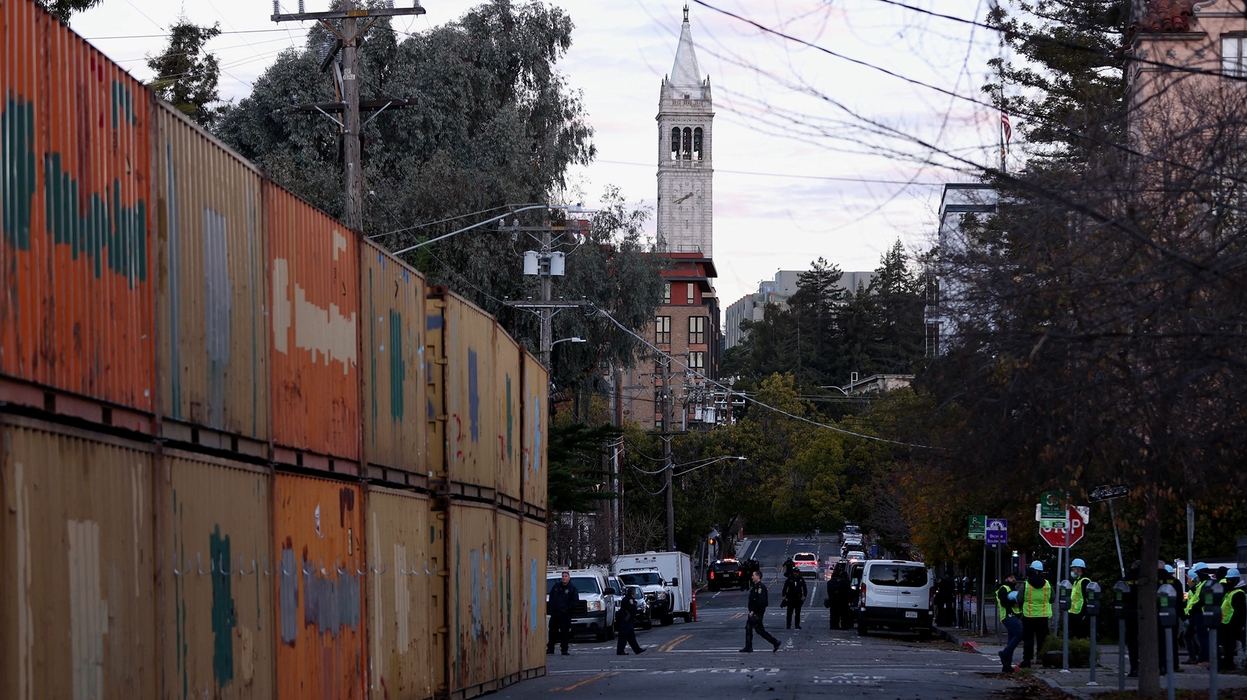UC Berkeley launches closure of People’s Park construction site
The campus awaits a court ruling to build much-needed housing for students and unhoused people.
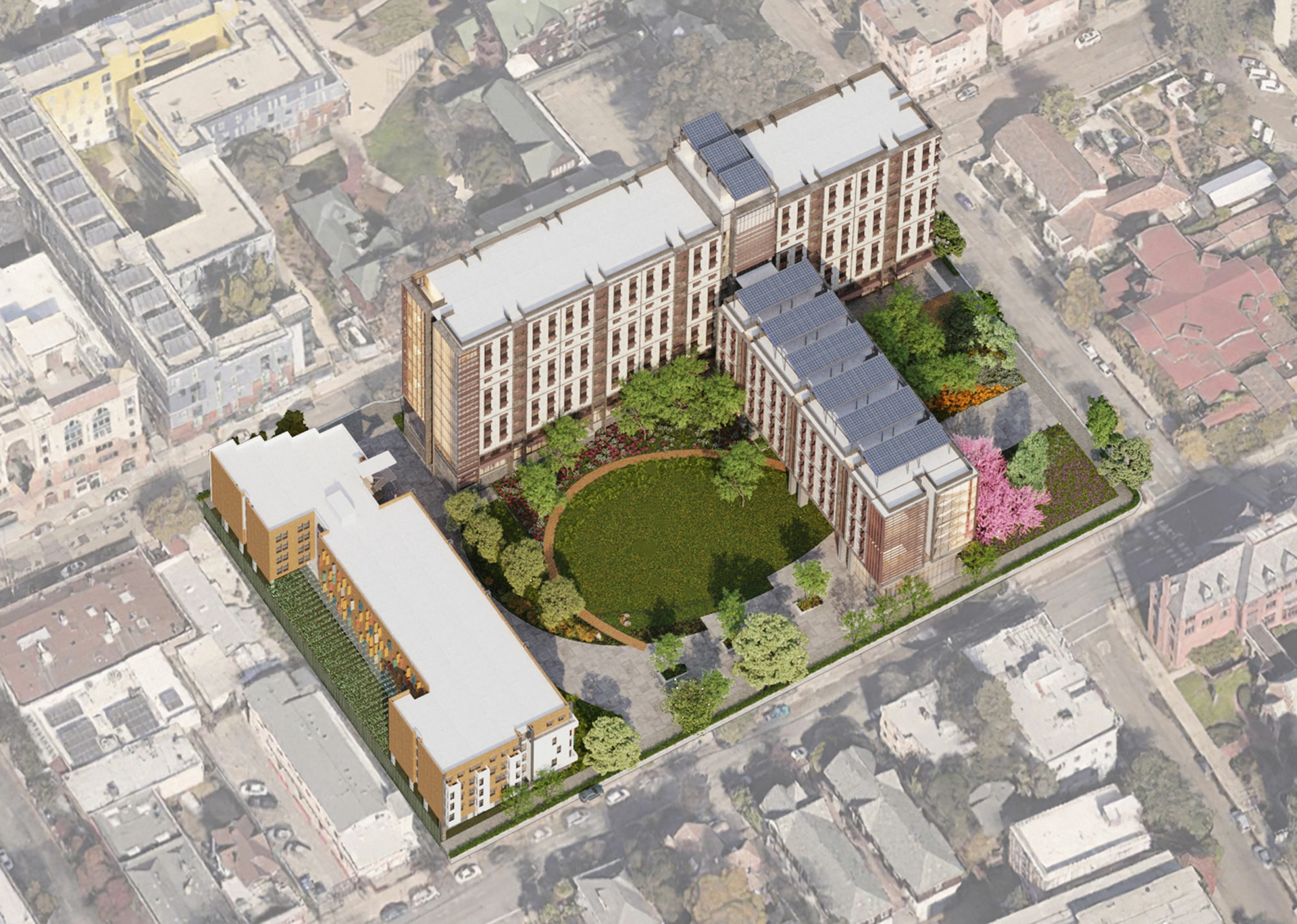
LMS Architects/Hood Design Studio
January 3, 2024
UC Berkeley began work early Thursday morning to close the People’s Park construction site, where it will build housing for students and for unhoused people, pending resolution by the California Supreme Court of legal challenges. It also plans to preserve more than 60% of the 2.8-acre site, revitalizing open park space that also reinforces the park’s history.
While the campus awaits this ruling, it is enforcing its legal right to close the construction zone by surrounding it with a border of double-stacked shipping containers, the kind typically used for freight transport.
Nearby streets will be closed for a few days so work crews can access the UC-owned property bounded by Telegraph Avenue, Haste and Bowditch streets and Dwight Way.
The site is being closed now to minimize disruption for the city of Berkeley and campus communities. Berkeley students are on winter break, and 21 of the 25 people camping there last November, when a census was taken, voluntarily accepted an offer of transitional housing at the Quality Inn in Berkeley. There, a city-campus partnership is providing shelter, food, storage for residents’ belongings and a path to permanent housing.
In early August 2022, the campus paused construction when violence, unlawful protest, and destruction of workers’ equipment and materials ensued, causing $1.5 million in damage. Meanwhile, activists opposed to the housing projects filed an injunction with the state appellate court, which kept construction halted. The court ruled in the plaintiffs’ favor last February; the campus has appealed the decision to the state Supreme Court.
“The existing legal issues will inevitably be resolved, so we are taking this necessary step now to minimize the possibilities of conflict and confrontation, and of disruption for the public and our students, when we are cleared to resume construction,” said Chancellor Carol Christ. “Unfortunately, our planning and actions must take into account that some of the project’s opponents have previously resorted to violence and vandalism.”
Christ added that the project has strong support from Berkeley students, community members, advocates for unhoused people, the city’s elected leadership, the state Legislature and the governor.
Said Berkeley Mayor Jesse Arreguín, “We’re proud to be supporting a project that will honor the legacy of People’s Park and better meet the needs of our community through an effort that’s deeply reflective of the city’s and university’s values.”
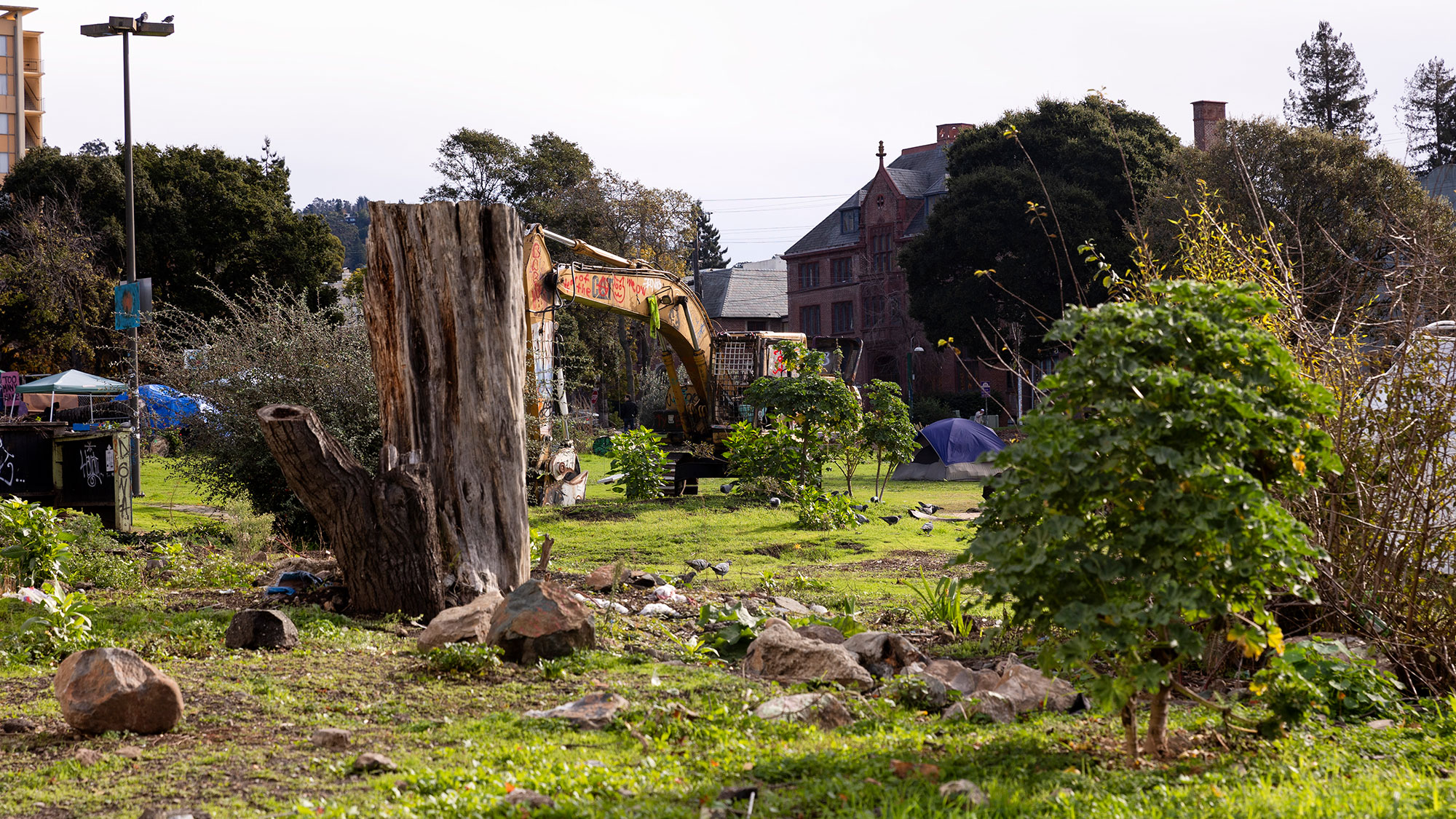
Brittany Hosea-Small for UC Berkeley
An alarming escalation of crime
Concerns about the safety of unhoused people camping at the site, and of students and others living and working near it, fueled the decision to close it off. Ever since no-camping rules were suspended at the park in 2020 due to the COVID-19 pandemic, crime there has escalated alarmingly, and people gathering and sleeping there often were victims.
We have concern and care for everyone who has been sleeping and gathering in the park … It is my job to make sure people are safe and feel safe.
UC Berkeley Police Chief Yogananda Pittman
Reported crimes in and around the site in the past three years include 18 rapes, 19 robberies and 110 aggravated assaults, according to UC police. There also were 48 drug and six weapons arrests.
In 2021, a Berkeley undergraduate was stabbed after walking past People’s Park at night; the suspect has been charged with attempted murder.
A big jump in crime occurred in 2022 alone: seven rapes, 54 aggravated assaults — crimes that involve the attempt to murder, rob, kill, rape or assault with a deadly or dangerous weapon — and 12 incidents of arson.
“We have concern and care for everyone who has been sleeping and gathering in the park, as well as for members of the campus and city communities who live in close proximity to the site,” said UC Berkeley Police Chief Yogananda Pittman. “It is my job to make sure people are safe and feel safe.”
Pittman stressed her hope that the construction site can be closed safely and expeditiously in the coming days, without incident, and she said security will be in place 24/7.
To create a revitalized park space that is open and welcoming to all, the campus’s plans include ample outdoor lighting, accessible pathways, gardens with colorful native plantings, sunny spaces to relax, a lush grove of trees and a focus on visibility — no hidden corners. Entries and windows in the new student and supportive housing buildings will face the parkland and allow residents to view and monitor activities there.
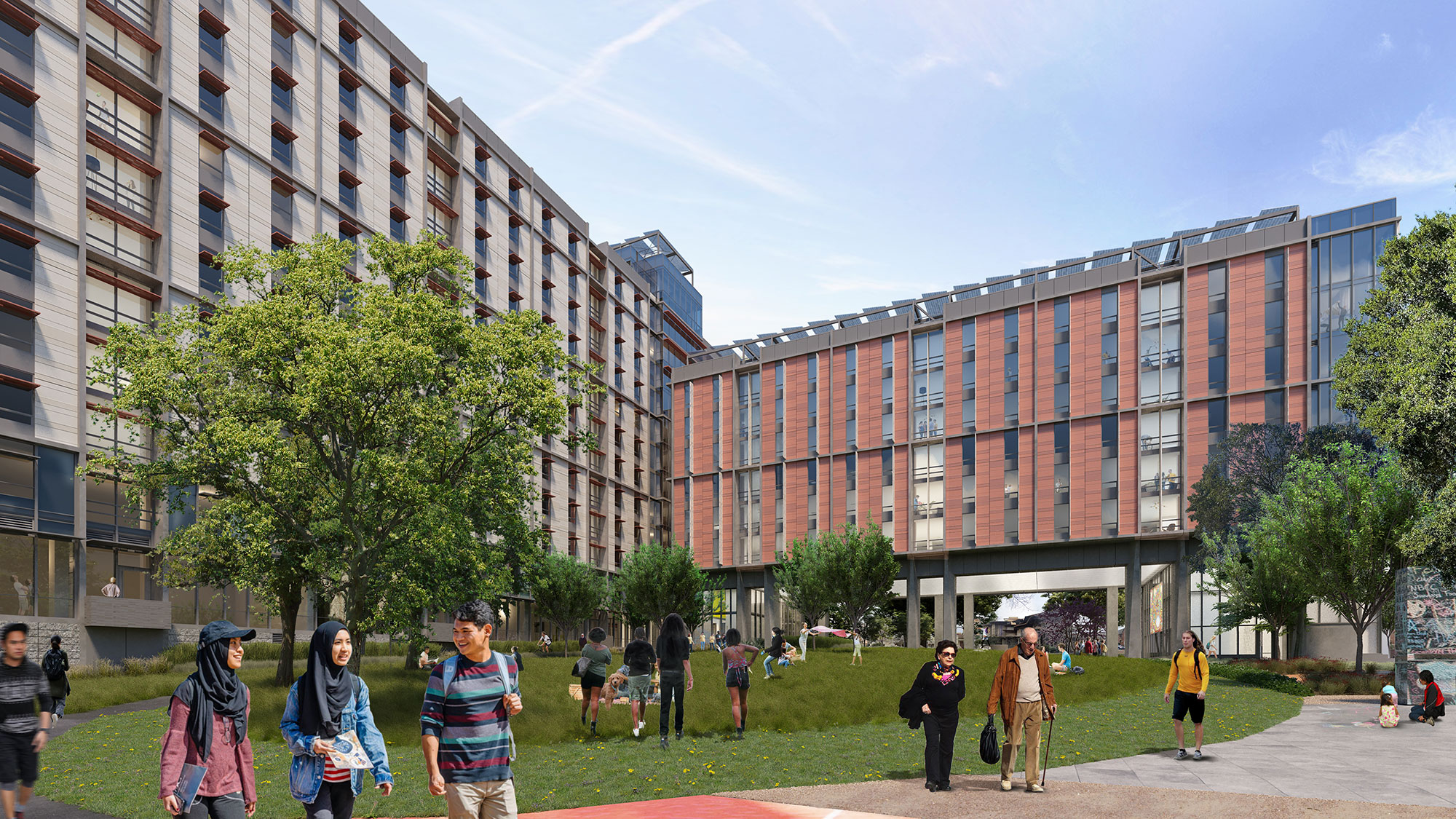
LMS Architects/Hood Design Studio
A common cause, inspiring teamwork
UC Berkeley has a longstanding commitment to its unhoused neighbors and the well-being of all those living and working near campus. In 2017, for example, it hired a full-time social worker, Ari Neulight, a homeless outreach coordinator who so far has helped more than 200 people in the park and the surrounding area to transition to permanent housing.
Berkeley conducted years of public engagement and rigorous environmental review to develop its extensive plan for People’s Park; the plan has been endorsed by Berkeley students 2-to-1, and by Arreguín, city council members, media outlets, neighbors, local churches, faculty experts and advocates for unhoused. Construction of the student residence hall for more than 1,100 sophomores, juniors and seniors and the public park, which will commemorate the site’s storied history, is expected to take a few years.
Our partnership will put a roof over the heads of those living in People’s Park instead of simply pushing them from one neighborhood to another.
Berkeley Mayor Jesse Arreguín
After that, work on the permanent, supportive housing facility, with 125 apartments and onsite services for very low income and formerly unhoused people, will start. The city of Berkeley has earmarked $14 million for this project, which will be constructed by a developer with extensive experience building affordable housing.
Permanent, supportive housing provides residents with a safe, reliable place to live, a permanent address, and case management that connects them to needed services. This evidence-based intervention also lowers public costs: For chronically unhoused individuals, in particular, it reduces the use of crisis services, such as shelters, paramedic responses, emergency rooms, psychiatric centers and jails.
The chancellor pledged in 2021 that People’s Park would not close until housing, support services and a new daytime gathering center existed for unhoused people there.
In March 2022, she and Arrequín announced novel partnerships to keep those promises. That summer, 89 unhoused people accepted shelter at the city’s Rodeway Inn and at other locations, and a new Sacred Rest Daytime Drop-in Center near the park began providing food, restrooms, showers and other relief.
Despite the subsequent pause in construction, the partners have continued to support their neighbors in need. Last November, a man from Guatemala camping at the site took Neulight’s offer of housing at the Quality Inn. But later that day, his family, including several babies, arrived, prompting Neulight to quickly coordinate with local nonprofits and others to assess the group for housing eligibility; the drop-in center provided food.
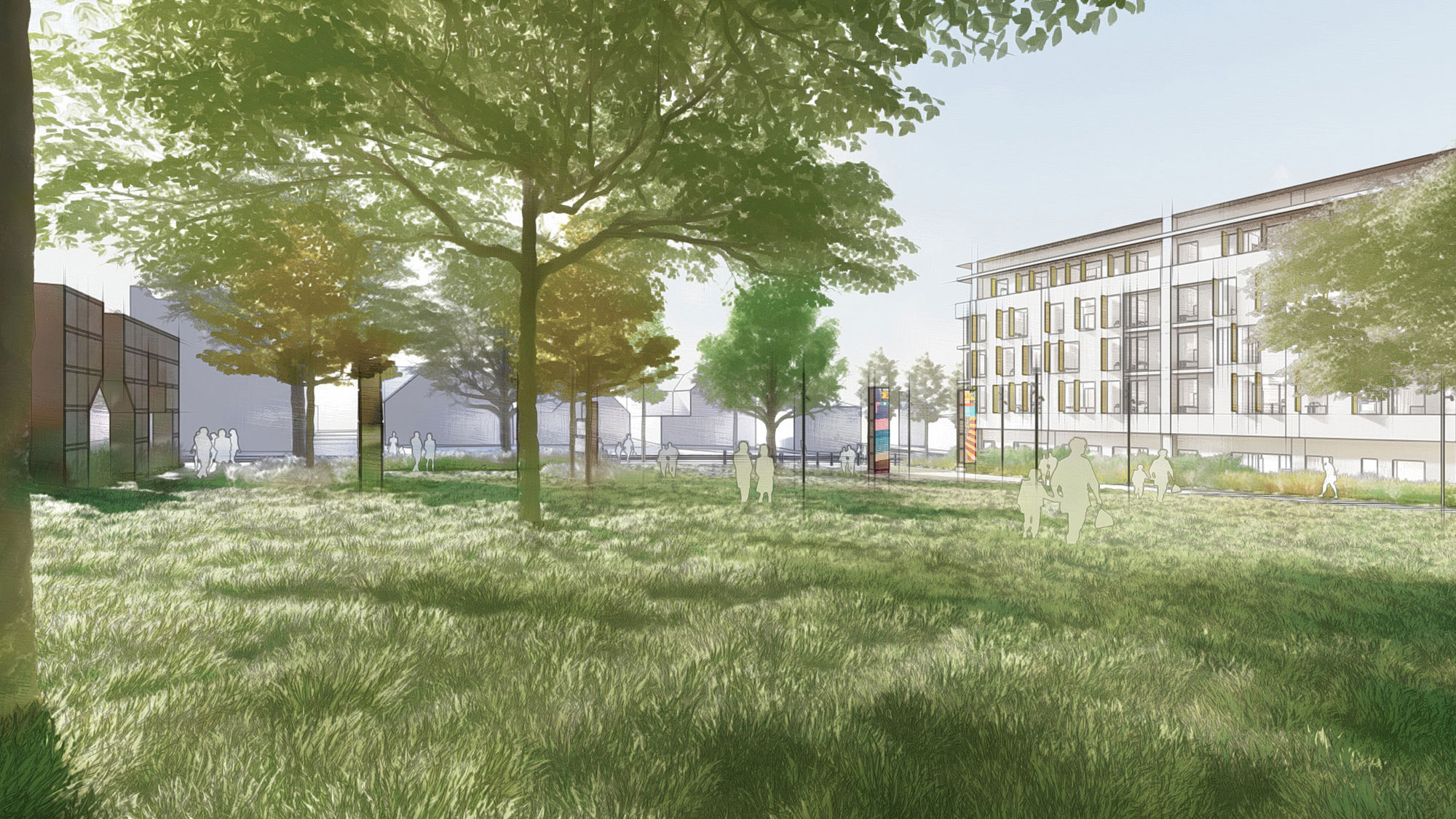
LMS Architects/Hood Design Studio
“Within a week,” said Ruben Lizardo, UC Berkeley director of local government and community relations, “the team got everyone placed in housing — not all at the Quality Inn, but also in Richmond and Hayward, and at a time when shelter access everywhere was limited. That work, which was apart from the development project, is a testament to the commitment of this partnership. The teamwork is really inspiring.”
“Our partnership will put a roof over the heads of those living in People’s Park instead of simply pushing them from one neighborhood to another,” said Arreguín.
Added Lizardo, “We’re not turning our backs on people in need. Even after the park is closed for construction, the coalition will keep working together for this common cause.”
Urgently needed: 9,000-plus new beds for students
UC Berkeley needs more than 9,000 new student beds, double what it currently offers, to meet its housing initiative goals: two years of housing for first-year students and one year for new transfer students and graduate students. That means building on all feasible, university-owned sites close to campus, including the People’s Park construction site. Two large student housing projects will open for the 2024-25 academic year — Anchor House, with 772 beds, and Albany Village, with 761 beds — but thousands of additional, affordable beds are necessary.
Compared to the other UC campuses, Berkeley houses the least number of undergraduate and graduate students. The situation has forced approximately 20% of its students, faced with renting high-priced local apartments instead, to move away from Berkeley, undermining their ability to fully experience all the campus offers.
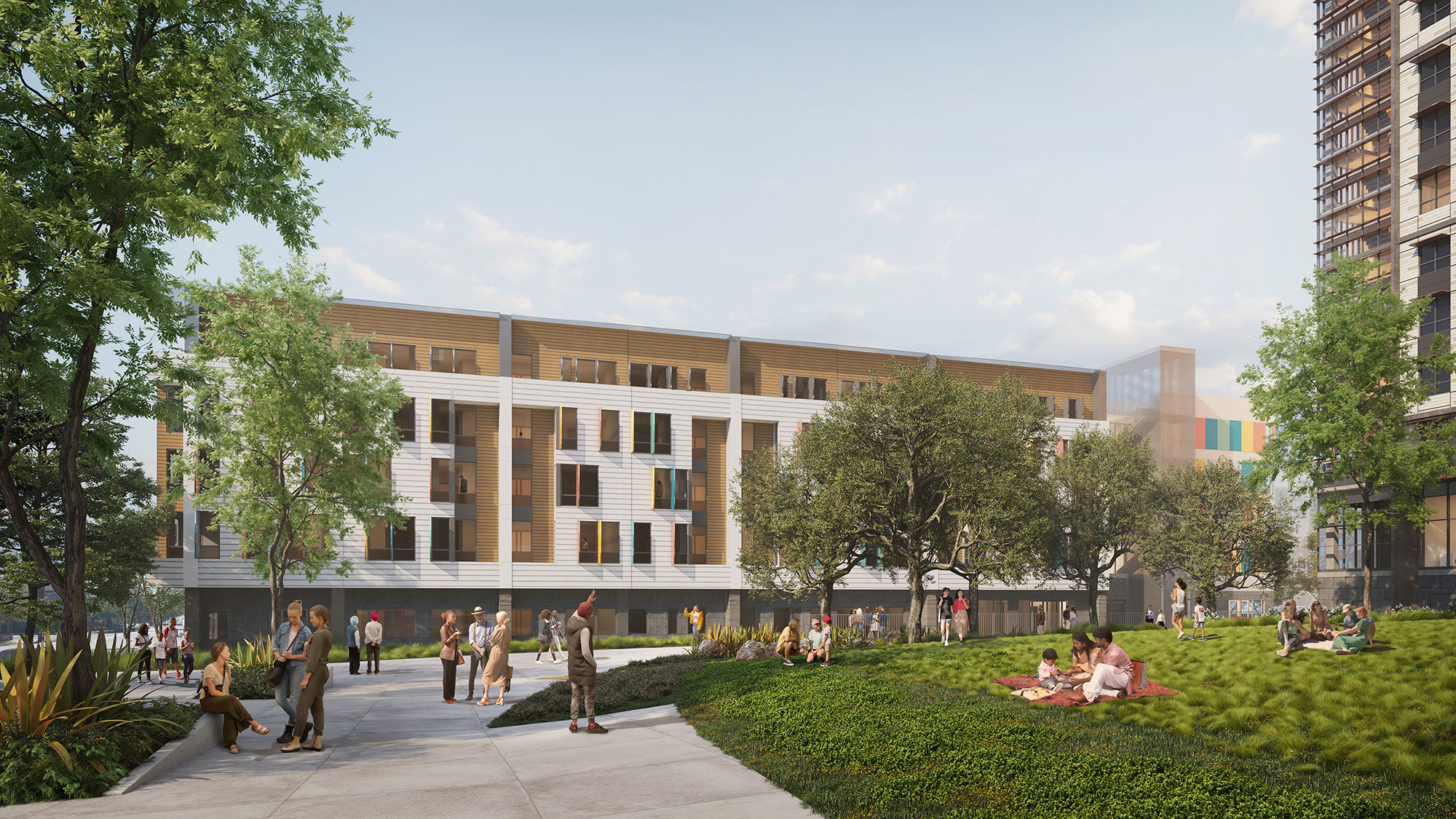
LMS Architects/Hood Design Studio
Last February’s ruling by the state’s First District Court of Appeal in San Francisco, which sided with the plaintiffs was, according to campus leaders, “an unprecedented and dangerous decision to dramatically expand CEQA,” the California Environmental Quality Act.
Left in place, the officials’ statement continued, the decision will indefinitely delay all the campus’s student housing plans and could prevent colleges and universities across California from providing their students with the housing they need and deserve.
In the wake of the appellate court’s decision, Gov. Gavin Newsom expressed his commitment to work with the Legislature to stop “a few wealthy Berkeley homeowners” from blocking desperately-needed student housing, and any affordable housing, by weaponizing the 1970 California Environmental Quality Act (CEQA), a law Newsom said “needs to change.”
Christ said UC Berkeley has gone “to great lengths to create a plan that is responsive to the needs and interests of not only our campus and students, but of the city and all its residents. We are grateful the campus and city communities have expressed their support. We continue to hope the opponents will listen.”
Learn more about Berkeley’s plans for People’s Park
